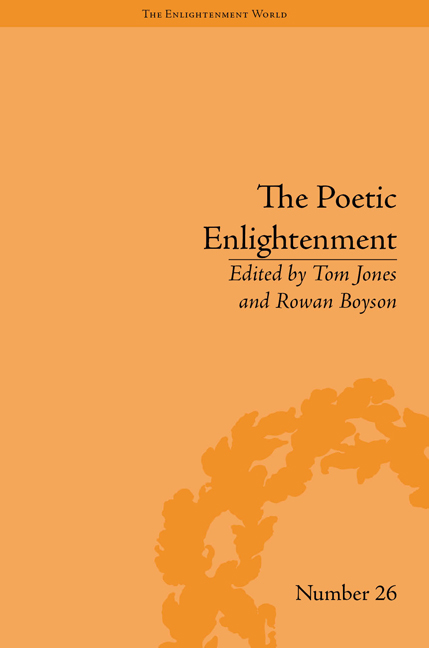Book contents
- Frontmatter
- CONTENTS
- Acknowledgements
- List of Contributors
- General Introduction
- I Poetic Knowledge and the Knowledge of Poetry
- II Poetic Theories of the Social Self
- III Enlightenment and Romantic Poetologies
- 10 Introduction: Poetry and/or Enlightenment
- 11 James Thomson's The Seasons and the Transformative Potential of Poetry in the Early Scottish Enlightenment
- 12 ‘Furnishing Light’: Wordsworth, Poetry and the Science of Man in Enlightenment Scotland
- 13 Wordsworth, Kant, Fanaticism and Humanity
- Notes
- Index
10 - Introduction: Poetry and/or Enlightenment
from III - Enlightenment and Romantic Poetologies
- Frontmatter
- CONTENTS
- Acknowledgements
- List of Contributors
- General Introduction
- I Poetic Knowledge and the Knowledge of Poetry
- II Poetic Theories of the Social Self
- III Enlightenment and Romantic Poetologies
- 10 Introduction: Poetry and/or Enlightenment
- 11 James Thomson's The Seasons and the Transformative Potential of Poetry in the Early Scottish Enlightenment
- 12 ‘Furnishing Light’: Wordsworth, Poetry and the Science of Man in Enlightenment Scotland
- 13 Wordsworth, Kant, Fanaticism and Humanity
- Notes
- Index
Summary
That poetry and Enlightenment might be allies, that there might indeed be a ‘poetic Enlightenment’ discernible in eighteenth-century thought: this is one wager of this volume, and it is intriguingly and surprisingly taken up by the three essays which follow.
Let me anticipate a question posed by Catherine Packham: ‘Where is poetry in the Scottish Enlightenment?’ Here are some possible answers: ballad collections; conjectural histories; antiquarian dissertations; the progress poem. The careers of Hugh Blair, James Beattie and Walter Scott. Late eighteenth-century British literati, antiquarians and poets allow us to pose Packham's question for a more general, not just a Scottish, Enlightenment. As Packham, Swift and Carboni suggest, poets themselves were vectors of Enlightenment discourse – at times anticipating certain nodes (see Carboni's Thomson forecasting Adam Smith's discourse on Man, sympathy and Nature), while also metabolizing crucial Enlightenment, or proto-Enlightenment, thought (for example, Shaftesbury's). The entanglement of poetry and Enlightenment is everywhere to be found in eighteenth-century British culture, if we have eyes to see and ears to hear. Consider the progressively enlightened protagonist Edwin in James Beattie's The Minstrel, tutored first by a balladeering Beldame and then into a sober maturity by a hermit historian. Consider the extraordinary proliferation of discourse around the Ossian poems, a discourse indebted to Scottish Enlightenment historiography. One might note, in numerous conjectural histories and literary-antiquarian essays, the repeated turns to poetry as evidence of a cultural stage. One might observe too the ascendancy and transformation of the progress poem (under which rubric we might include Beattie's Minstrel, John Clare's The Progress of Rhyme, or indeed, Wordsworth's Prelude). Consider Robert Wood's brilliant fusion of empirical and speculative inquiry in An Essay on the Original Genius of Homer (1769, 1775); or Walter Scott's Minstrelsy of the Scottish Border (1802'3), saturated in the discourses of moral philosophy, conjectural history and emergent political economy, as in his salute to ballads as possessing ‘considerable interest for the moral philosopher and general historian’. As these examples suggest, it is only a back-formation of a more rigidly imagined ‘modernity’ (or the strictures of a moth-eaten version of ‘romanticism’) that could ever imagine poetry and Enlightenment as opposed
- Type
- Chapter
- Information
- The Poetic EnlightenmentPoetry and Human Science, 1650–1820, pp. 121 - 126Publisher: Pickering & ChattoFirst published in: 2014



